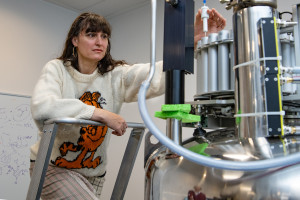Published May 26, 2023
Associate Professors Bridget Stocker and Mattie Timmer have discovered a new class of vaccine “helper” molecules known as adjuvants that could make a wide range of vaccines more affordable and effective.
Bridget and Mattie’s new class of adjuvant is more economical and easier to make compared to most adjuvants currently on the market, and emerging research shows that it works better, too.
Their discovery opens the possibility of enhancing vaccine performance in a very cost-effective way for both animal and human health across an array of diseases.
Immunoglycomics group. Clockwise from top: Jeremy Jones, Bridget Stocker, Mattie Timmer, Emma Dangerfield
The technology
When added to a vaccine formulation, the adjuvants developed by Bridget and Mattie bind to receptors on the outside of immune cells and stimulate two types of important immune responses, a T-cell response and an antibody response, against the target pathogen. The longer and stronger immune response ultimately leads to more protection from the vaccine.
“Some vaccines can work without adjuvants,” explains Bridget, “but most vaccines work better with them.”
There’s an art to developing adjuvants that sit within the ‘goldilocks’ zone of efficacy. “While we want to boost the immune response, we don’t want the response to be too strong and risk giving the patient undesirable side effects.”
To date, most research has focused on adjuvants which target proteins known as ‘toll like receptors’, but Bridget and Mattie’s adjuvants are different because they target a completely different receptor known as Mincle. Targeting Mincle leads to a unique immune response that can be used in vaccines against several pathogens.
Each vaccine requires its own unique adjuvant system to stimulate the goldilocks level of immune response. A vaccine needs to contain two parts – an antigen, the part of the pathogen that triggers an immune response and memory of the disease, and the adjuvant, which boosts the immune response to the antigen.
“It’s like making a cake. We have the base ingredient, the antigen, and the adjuvants add the flavour. We are building a pantry shelf stocked with different flavoured adjuvants which can be added to vaccine cake – let's say, chocolate chips in one cake, and apricots in the other.”
Unlocking new markets
Jeremy Jones
Wellington UniVentures’ Senior Commercialisation Manager Jeremy Jones has been working alongside Bridget and Mattie to bring their innovation to market.
At the end of last year, Wellington UniVentures licensed a set of their adjuvants to a US biotech company that will use them in clinical trials against a range of human diseases. It’s the first step in what is expected to be a long line of commercial successes for this team.
Jeremy is also excited about introducing these adjuvants to the animal health market through a new startup.
“Margins are slim in the livestock market, so most animal vaccines use decades old adjuvant technology. Currently the best vaccine technology is reserved for human health simply because it is so expensive,” explains Jeremy. “At the end of the day, farmers won't use a sheep vaccine that costs more than the sheep itself.”
But many of the Mincle adjuvants developed by Bridget and Mattie are economical and easy to produce, unlocking a new market in animal health.
“We’re preparing to launch a new company that will partner with animal health vaccine developers to get our adjuvants into their products. Our initial focus will be on vaccines for livestock as this is where we have seen greatest efficacy gains.”
Recently the team partnered with AgResearch to secure an MBIE grant to test their adjuvants in a vaccine designed to prevent sheep pneumonia. The first two stages are successfully completed and show exciting results.
They are also preparing to trial a salmonella vaccine in pigs, to demonstrate that a vaccine containing their adjuvants provides superior protection to what is currently on the market.
All going according to plan, Jeremy expects the new company to launch before the end of the year.
“The licenses we have secured in the human health applications confirm our belief that these adjuvants can accelerate vaccine technology forward.
“Now, we are focused on spinning out a company that’s going to take the animal health side of things to market. Being able to capitalize on the entire portfolio of research in this way feels like we’re having our cake and eating it, too.”

Livestock stand to benefit from the new adjuvants
Cautiously optimistic

Bridget Stocker
Bridget says that if, at the start of her career, someone had told her that the output of her and Mattie’s research would be going into clinical trials, she wouldn’t have believed them. “It’s not from a lack of faith in our science, but an understanding of how hard it is to get a drug out there.”
With less than 1 in 5000 drug compounds making the perilous journey from lab bench into medicine cabinet, Bridget is right to be cautiously optimistic.
Their success so far is testament to their exceptional discovery, dogged commitment to the highest quality science, and a trusting relationship with Wellington UniVentures.
“Jeremy gets it. He was a chemist himself, so he instinctively understands the science and the limitations on our time,” says Bridget.
As a naturally curious person, Bridget is intrigued by commercialisation but realistic about the challenges. “Science is hard. Commercialisation is hard. It’s important to surround yourself with people like Jeremy who are good at what they do and who you trust will do right by you.”
What excites Bridget and Mattie most about bringing their research to market is the impact it can have.
“If the goal is to be able to vaccinate more than just those who can pay big money for medicines, then cost is important. We have an adjuvant that works well and is relatively easy and inexpensive to produce. It can be a game changer.”
Medtech cluster
More than health benefits, Jeremy is ambitious about the new animal health company contributing to a thriving medical technology hub in Wellington.
“There is a nation-wide push to grow New Zealand as a leader in medical innovations that can compete on the world stage.”
New Zealand’s medtech sector is already estimated to be worth $2.1 billion and that figure is set to double by 2050, accounting for nearly 8,000 new full-time jobs.
“Many of the country’s most promising and innovative healthcare start-ups spin out of university research like the Mincle project.
“These new companies will form the backbone of New Zealand’s emerging med tech sector, attracting fresh talent to our cities, funnelling new grads into meaningful jobs, and encouraging young people to pursue science because it leads to exciting opportunities.”
